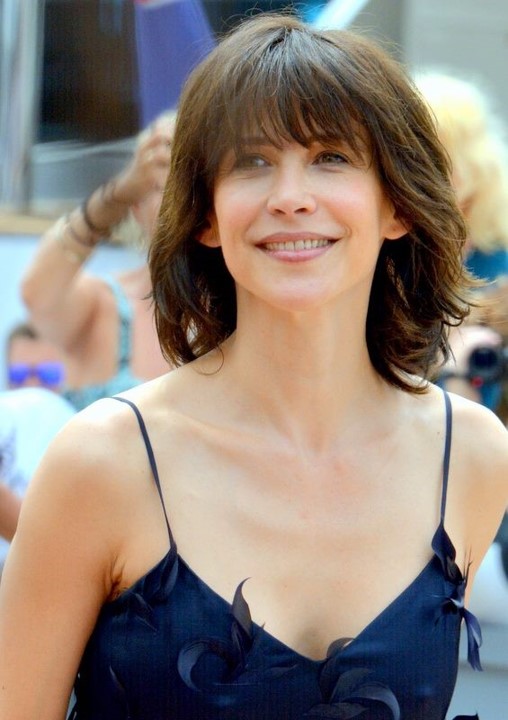Romy Solakian is a first-year student at the Cours Florent in Paris, one of the most prestigious private acting schools in the world with numerous alumni that have become staples in Hollywood, such as Diane Kruger, Daniel Auteuil and Sebastian Roché. She gives us a look behind the scenes of what it means to go to acting school, why she and so many others take the leap every year, and what it’s like to have your sights set on a career in the spotlight. Romy sits down to chat with me through FaceTime on a cold December morning, as her second module draws to a close.
Morgane Bauwens: Were you born with the desire to become an actor, or was it something you became passionate about as you grew older?
Romy Solakian: As far back as I can remember, I have always wanted to do this. The first important memory I have is movie related: we were watching Breakfast at Tiffany’s, and I was just so amazed that real people could tell realistic stories on TV – as a job – that I set my heart on this career when I was about five or six, and I have not changed my mind since.
Are you ever afraid to tell people about your aspirations to become an actor?
No (laughs). I definitely used to be. A few years ago, I got some really bad reactions to my aspirations and me being so vocal about them, so I stopped telling people for a while, but now, no. There’s no use in that. You are who you are, so why hide it? Besides, open minded people will understand how brave it is to go after your dreams, so you just have to surround yourself with the right people. You get used to the odd look here and there, but the passion you have for the craft makes it worth it.
Did you go to school for acting before attending the Cours Florent?
I had a classic primary and secondary education, but after graduating high school I did almost a year of private coaching with an actress in Germany, in which we covered almost everything we did during my first semester here at the Cours Florent.
Is experience in the dramatic arts required for admission?
It is preferred. There are two ways to get into the Cours Florent, but both require an audition. The first option is to have a year’s worth of acting experience, preferably professional, before you audition. The second is to do one of the internships they offer, in which they observe you and will potentially invite you to audition. Because I had taken acting classes, I went through the first audition process. It was stressful, but also thrilling. You have to prepare two monologues to present, and one of mine was a scene from The Great Gatsby, which is a story that’s very dear to me, so it was a great experience.

So why go to school for acting in the first place?
It is a very difficult industry to break through in, because you need to be well connected. If you don’t have any family who’s already in it, it can be next to impossible to get your foot in the door. Attending acting school not only helps you hone your craft, it also gives you access to people in the world of acting and allows you to build a network.
And out of all the options out there, why did you choose the Cours Florent?
I chose the Cours Florent because it was a school that my grandparents had mentioned a few times as I was growing up. It was also the institution some of the actors that I really admire like Pierre Niney, Isabelle Adjani and Sophie Marceau attended and talked about in their interviews. So, I suppose I’ve always known it existed, and upon doing a little more research, I realised that it has a fantastic programme, great teachers, and it’s a wonderful place to meet all sorts of people and build a network of your own.
“We all have something we want to share with the world.”
What kind of people are these teachers?
My teachers are actors. They’re people who have worked – or still do – in the industries of both film and theatre, or who worked in the industry for a little while and then figured out that they really wanted to teach and share their passion with students. They’re all a little quirky, in the best way possible. They’re very artistic and usually explain things by demonstrating them with a lot of passion and energy. They’re always on, always performing, always in that state of mind – in class, at least. Which is great, because it breaks the ice and helps you come out of your shell as well; it’s as if seeing them do it as the teacher makes it okay for you to do the same.
Sounds like they’re a reassuring presence and create a safe space for you to explore your passion.
They really do. But, there is, of course, discipline through all the creativity, and when it’s time to be serious then it’s time to be serious. They also know how to convey that the process is hard work.
And what about your peers, what kind of people are they?
Oh, it’s a whole rainbow. There are so many different personalities, but the common denominator is that we all have something we want to share with the world, and we’re all passionate about acting, performing, entertaining. We’ve got people from all over: France, the Netherlands, England, even Peru, for instance. It’s such a privilege to be able to work with so many different kinds of people, and it’s a great mix in class.
You mentioned that an institution allows you to build a network, but connections alone don’t make for a good actor, of course. What traits does someone in the industry need?
Ooh, that’s a tough question. I think a good actor is true to themselves and has enough courage to be vulnerable and share that with the world. Someone who is down to earth, because that can be difficult when you’re swept up in the glamour, but being grounded makes you a better performer. Oh, and a good actor is in touch with their feelings, because they need to portray all sorts of experiences, and a hard worker, because doing that takes dedication and consistency.
Do you think an actor needs to be highly empathetic to be able to portray all kinds of characters and emotions?
Absolutely. Empathy is especially important in the methods actors have been using for the last few decades. Back when Hollywood started to boom, it was all about pretending and mimicking, but today we have widely adopted the Stanislavsky method, which is all about acting from the heart and your own emotions. To give the best performance that you possibly can, you have to use all of the tools in your toolbox, for which you need to be empathetic and sensitive, but you also need to learn to protect that capacity for empathy.
Does acting school teach you how to do that?
Yes, we are encouraged to take breaks whenever we need to, and when we feel overwhelmed our boundaries are respected. We also have a safe word system in our school, which allows us to indicate that we’ve reached a limit and need to stop for a minute.
That’s so important. You touched briefly on the fact that the industry is so difficult to get into, so why do you think so many people still try to become an actor?
[ponders] Because it’s a passion. It’s like a fire that burns inside you, and as long as it burns, you have to do something about it. I think so many people still give it a shot because it’s such a beautiful thing to chase your dream and share your passion with others.
Absolutely. As you’ve had some training in both, can you tell us if there is a difference between acting for the stage and acting for the screen?
Yes, a big one. Acting for the screen is a much more internal process, and your facial expressions can be more subtle. It’s all about believability and relatability. Most of the time the viewer watches a movie at home: it’s not dark, there are no stage lights or people in front of you… it’s much more poignant to me. Theatre, on the other hand, is a show. You put on a show for people, so everything is a little more exaggerated. They’re two different styles.
Does the school offer separate training for both?
The basis of acting is the same for both, so during the first year we focus on theatre and in the second year we can choose to stay with only theatre or to combine screen and stage.
Why focus on theatre first?
Everyone in the industry says that actors who have studied or done theatre are taken more seriously, because they have more discipline and they know that repetition is key. I believe it was Al Pacino who said that creation happens in repetition. When you go on stage four nights a week on top of two matinees, you’re really living your role because you do it over and over again. And directors on movie sets can really appreciate when actors have created that discipline and accepted that almost endless repetition is simply part of the job.
“It’s important that we keep making a point through our art.”
Being part of the next generation of actors, can you tell us if there are any tendencies in cinema that we can expect to see in the future?
I think that we – my generation and the one that is already in Hollywood right now – are not shying away from the difficult subjects. On the contrary, we want to shed light on things that are considered taboo or too uncomfortable to talk about, let alone showcase. And I think that’s very important, because actors can not only use their platform to advocate for important matters, but also their art. I think that’s what this next generation of actors is trying to bring to Hollywood.
So you believe activism has a place in the arts? Absolutely. I think it’s crucial for actors to use the platforms they are given to speak out on things and to try to spread awareness. It’s important that we do what we can to get people involved in causes, to participate in initiatives or donate to charities or funds that might not receive enough attention on their own. As for cinematic art specifically, there’s a production company called A24 that has been revolutionising cinema in the last few years by touching on subjects that no one has before, which is great because movies are so accessible and have such a wide reach that we can hope to make real change. For instance, C’mon C’mon is an emotional film that gives a voice to children and explores their concerns about the world and their futures, and Causeway is about a female soldier who suffers a traumatic brain injury in Afghanistan and struggles to adapt to life back home with her mother as she waits for eventual redeployment. Whether a film is obvious about its theme or just quietly advocating through metaphor doesn’t matter, it’s just important we keep making a point through our art.
